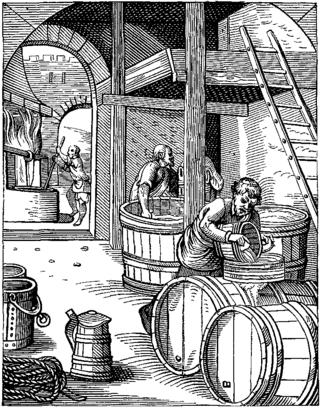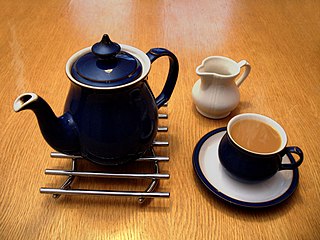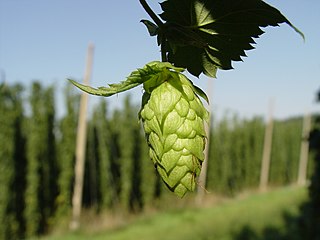
Beer is one of the oldest alcoholic drinks in the world, the most widely consumed, and the third most popular drink after water and tea. It is produced by the brewing and fermentation of starches from cereal grains—most commonly malted barley, although wheat, maize (corn), rice, and oats are also used. The fermentation of the starch sugars in the wort produces ethanol and carbonation in the beer. Most modern beer is brewed with hops, which add bitterness and other flavours and act as a natural preservative and stabilising agent. Other flavouring agents, such as gruit, herbs, or fruits, may be included or used instead of hops. In commercial brewing, natural carbonation is often replaced with forced carbonation.

Brewing is the production of beer by steeping a starch source in water and fermenting the resulting sweet liquid with yeast. It may be done in a brewery by a commercial brewer, at home by a homebrewer, or communally. Brewing has taken place since around the 6th millennium BC, and archaeological evidence suggests that emerging civilizations, including ancient Egypt, China, and Mesopotamia, brewed beer. Since the nineteenth century the brewing industry has been part of most western economies.

A drink or beverage is a liquid intended for human consumption. In addition to their basic function of satisfying thirst, drinks play important roles in human culture. Common types of drinks include plain drinking water, milk, juice, smoothies and soft drinks. Traditionally warm beverages include coffee, tea, and hot chocolate. Caffeinated drinks that contain the stimulant caffeine have a long history.

Hops are the flowers of the hop plant Humulus lupulus, a member of the Cannabaceae family of flowering plants. They are used primarily as a bittering, flavouring, and stability agent in beer, to which, in addition to bitterness, they impart floral, fruity, or citrus flavours and aromas. Hops are also used for various purposes in other beverages and herbal medicine. The hops plants have separate female and male plants, and only female plants are used for commercial production. The hop plant is a vigorous, climbing, herbaceous perennial, usually trained to grow up strings in a field called a hopfield, hop garden, or hop yard when grown commercially. Many different varieties of hops are grown by farmers around the world, with different types used for particular styles of beer.

Stella Artois is a pilsner beer, first brewed in 1926 by Brouwerij Artois in Leuven, Belgium. In its original form, the beer is 5.2 per cent ABV, the country's standard for pilsners. The beer is also sold in other countries including the UK, Ireland, Canada and Australia, where it has a reduced ABV. Stella Artois is owned by Interbrew International B.V. which is a subsidiary of the world's largest brewer, Anheuser-Busch InBev SA/NV.

Homebrewing is the brewing of beer or other alcoholic beverages on a small scale for personal, non-commercial purposes. Supplies, such as kits and fermentation tanks, can be purchased locally at specialty stores or online. Beer was brewed domestically for thousands of years before its commercial production, although its legality has varied according to local regulation. Homebrewing is closely related to the hobby of home distillation, the production of alcoholic spirits for personal consumption; however home distillation is generally more tightly regulated.

Craft beer is a beer that has been made by craft breweries, which typically produce smaller amounts of beer, than larger "macro" breweries, and are often independently owned. Such breweries are generally perceived and marketed as emphasising enthusiasm, new flavours, and varied brewing techniques.
Homebrewing mainly refers to small-scale, non-commercial manufacture of a drink, typically beer.

Joseph Schlitz Brewing Company was an American brewery based in Milwaukee, Wisconsin, and was once the largest producer of beer in the United States. Its namesake beer, Schlitz, was known as "The beer that made Milwaukee famous" and was advertised with the slogan "When you're out of Schlitz, you're out of beer". Schlitz first became the largest beer producer in the US in 1902 and enjoyed that status at several points during the first half of the 20th century, exchanging the title with Anheuser-Busch multiple times during the 1950s.

Steeping is the soaking of an organic solid, such as leaves, in a liquid to extract flavours or to soften it. The specific process of teas being prepared for drinking by leaving the leaves in heated water to release the flavour and nutrients is known as steeping. Herbal teas may be prepared by decoction, infusion, or maceration. Some solids are soaked to remove an ingredient, such as salt, where the solute is not the desired product.

In brewing, adjuncts are unmalted grains or grain products used in brewing beer which supplement the main mash ingredient. This is often done with the intention of cutting costs, but sometimes also to create an additional feature, such as better foam retention, flavours or nutritional value or additives. Both solid and liquid adjuncts are commonly used.

Kegerator, a portmanteau of the words keg and refrigerator, is a refrigerator that has been designed or altered to store and dispense kegs.

Beer is one of the oldest human-produced drinks. The first chemically confirmed barley-beer – from the area of Mesopotamia, part of modern-day Iraq – dates back to the 5th millennium BCE. The written history of ancient Egypt and Mesopotamia records the use of beer, and the drink has spread throughout the world; a 3,900-year-old Sumerian poem honouring Ninkasi, the patron goddess of brewing, contains the oldest surviving beer-recipe, describing the production of beer from barley bread, and in China, residue on pottery dating from around 5,000 years ago shows that beer was brewed using barley and other grains.

Lautering is the beer brewing process that separates the mash into clear liquid wort and residual grain. Lautering usually consists of three steps: mashout, recirculation, and sparging.

Taiwan Tobacco and Liquor Corporation, is a state-owned manufacturer and distributor of cigarettes and alcohol, and also formerly a state-sanctioned alcohol beverage brewing and retailing monopoly, in Taiwan. Its most famous product is Taiwan Beer. Other products include wine, Japanese-style liqueurs, Chinese herb liqueurs, and various distilled spirits.
Wort is the liquid extracted from the mashing process during the brewing of beer or whisky. Wort contains the sugars, the most important being maltose and maltotriose, that will be fermented by the brewing yeast to produce alcohol. Wort also contains crucial amino acids to provide nitrogen to the yeast as well as more complex proteins contributing to beer head retention and flavour.

Pito is a type of beer made from fermented millet or sorghum in northern Ghana, parts of Nigeria, and other parts of West Africa. It is made by small (household-level) producers, and is typically served in a calabash outside the producer's home where benches are sometimes provided.

A brewery or brewing company is a business that makes and sells beer. The place at which beer is commercially made is either called a brewery or a beerhouse, where distinct sets of brewing equipment are called plant. The commercial brewing of beer has taken place since at least 2500 BC; in ancient Mesopotamia, brewers derived social sanction and divine protection from the goddess Ninkasi. Brewing was initially a cottage industry, with production taking place at home; by the ninth century, monasteries and farms would produce beer on a larger scale, selling the excess; and by the eleventh and twelfth centuries larger, dedicated breweries with eight to ten workers were being built.

BrewDog is a multinational brewery and pub chain based in Ellon, Scotland. With production of over 800,000 hectolitres, BrewDog claims to be the "#1 Craft Brewer in Europe". It was founded in 2007 by James Watt and Martin Dickie, who together own 46% of the company.

Beer in Slovakia has been produced and consumed at least since the 15th century. Together with the neighbouring Czech Republic, with whom it has a shared and intertwined history, Slovakia has a number of breweries and a rich beer culture.

















